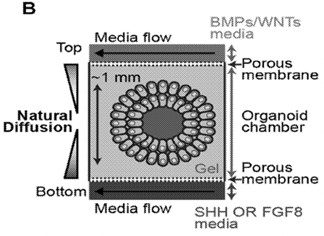Three-dimensional organoid culture system for basic, translational, and drug discovery research
Brief Description
Researchers at UC Irvine have developed an organoid culture system capable of generating three-dimensional molecular gradients. This recapitulates in vivo tissue development more accurately than current two-dimensional organoid culture systems and will allow scientists to study human-specific disease mechanisms in native tissue.
Suggested uses
·Organoid culture for studying neurological disorders.
·Organoid culture for drug discovery/screening.
Features/Benefits
·Enhance our understanding of human-specific disease mechanisms.
·Recapitulate in vivo tissue development more accurately.
·High-throughput drug screening applications.
·Three-dimensional molecular gradient system.
Technology Description
Studying neurological disorders has long been a challenge for scientists due to the limited availability of human brain tissue and the incredible complexity specific to human brains. While much progress has been made using 2D human/rodent nerve cell cultures, they lack the 3D environment present in tissues. The recent development of the organoid, a self-organized 3D tissue typically derived from stem cells, has given scientists a new system for studying diseases at the tissue level. Organoids enable patient specificity (as they can be derived from patient stem cells) while recapitulating 3D tissue-like structure and function in a dish. Furthermore, they are also more accessible for manipulation and in-depth biological studies compared to rodent disease models. Unfortunately, this system suffers from poorly controlled development and exhibits significant variability in cellular complexity. This highlights the need for more effective ways of developing organoids such that the stem cells they are derived from can more accurately recapitulate native organ development.
Researchers at UC Irvine have developed a 3D organoid culture system that allows for the delivery of multiple “molecular gradients” (see Figure). These molecular gradients are critical for stem cell-directed tissue patterning and development and have allowed these researchers to generate properly formed human brain organoids with defined brain regions such as the cortex, hippocampus, and amygdala. The researchers have demonstrated that the delivery of these molecular gradients does indeed result in graded gene expression throughout the organoid (i.e. high expression of gene X and low expression of gene Y on one end of the organoid, low expression of gene X and high expression of gene Y on the other end of the organoid). This bioengineering solution allows for more faithfully recapitulated, human-derived brain organoids and provides a platform for studying human-specific disease mechanisms and drug screening applications. Additionally, this culture system can be developed to generate organoids from other tissues such as the intestine and heart.

Patent Status
Patent Pending
State Of Development
In vitro studies
Related Materials
Contact
- Alvin Viray
- aviray@uci.edu
- tel: View Phone Number.
Inventors
- Watanabe, Momoko
